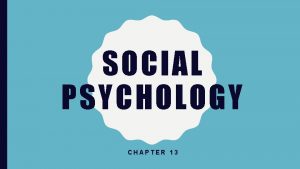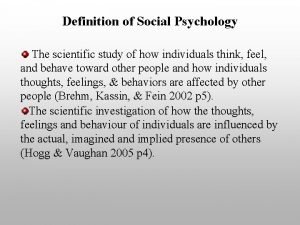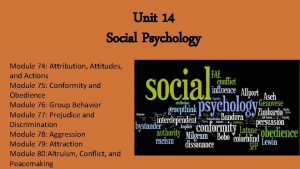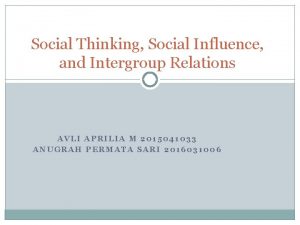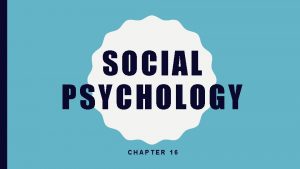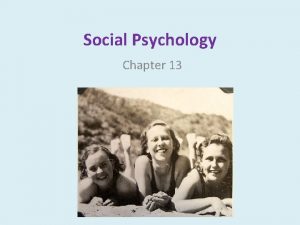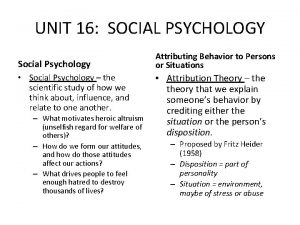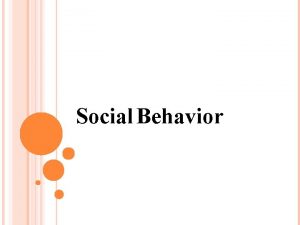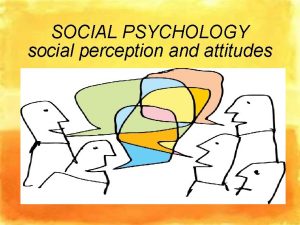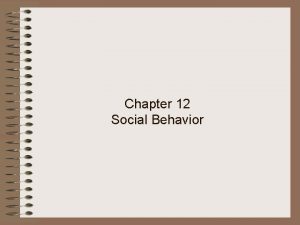Social Psychology The study of how we think

























- Slides: 25

Social Psychology The study of how we think about, influence, and relate to one another.

Social Influence

Conformity • Adjusting one’s behavior or thinking to coincide with a group standard.


Asch’s Study

Asch’s Results • About 1/3 of the participants conformed. • 70% conformed at least once. To strengthen conformity: • • The group is unanimous The group is at least three people. One admires the group’s status One had made no prior commitment

Reasons for Conforming Normative Social Influence • Influence resulting from a person’s desire to gain approval or avoid disappointment. (respecting norms) Informational Social Influence • Influence resulting from one’s willingness to accept others’ opinions about reality. (Assuming others are right/ conforming to opinions)

Who is most likely to conform? • Adolescents • Women are slightly more likely than men, but the difference is very small and depends on the specific type of situation. • Cultures valuing interpersonal harmony (e. g. , some cultures in Asia, Africa, and South America) • People with low self-esteem are more likely to conform than those with high selfesteem.

Do Now • Zoey wants to buy a new car but is having difficulty deciding what kind of car to buy. She is feeling anxious and wants to make a decision soon. Zoey visits several local car dealers and asks for advice of some of her friends. Explain how each of the following could influence her decision. Be sure to discuss each concept in the context of Zoey’s decision. – – – – Central route to persuasion Peripheral route to persuasion Heuristics Rationalization Self-efficacy The autonomic nervous system. Fundamental Attribution Error

Would You Obey? • You are a private in the army during a war and your company has been assigned to search a small, rural village in a foreign country for enemy spies. You find that mostly women, children, and elderly citizens populate the village. Your commanding officer, noting that the enemny has a reputation for infiltrating small vilages, decides that they may be spies and orders all the villagers killed and their homes burned. Would you obey your commander’s orders? Explain

Would You Obey? • You are a nurse at a large, reputable hospital. Hospital rules state that you are not to accept a doctor’s order by phone to administer medication to a patient—those orders must be given in writing. A doctor calls and insists that you administer 20 milligrams of a drug to a patient though the label on the drug says not to exceed 10 milligrams per dose. Would you obey the doctor’s orders? Explain.

Would You Obey? • You are a freshmen at a major university that is renowned for its psychological research. In response to an ad, you agree to take party in a study on learning. The experimenter instructs you to give the other volunteer subject a word association test. Each time the subject gives the wrong answer you are to administer an electric shock. With each wrong answer, you are to increase the voltage of the shock. After a while, the subject begins to protest. Complaining of pain, he begs you to stop. The experimenter instructs you to continue. Would you obey and continue the experiment? Explain.

Obedience Milgram’s Experiments

Milgram’s Obedience Study

What did we learn from Milgram? • Ordinary people can do shocking things. • Ethical issues…. • Would not have received approval from today’s IRB (Internal Review Board).


Group Influence on Behavior Lets look at how groups effect our behavior.

Social Facilitation Theory • If you are really good at something…. or it is an easy task…you will perform BETTER in front of a group. • If it is a difficult task or you are not very good at it…you will perform WORSE in front of a group (social impairment).

Yerkes- Dodson Law • There is an optimal level of arousal for the best performance of any task: • easy tasks-relatively high • difficult tasks--low arousal • other tasks-moderate level

Social Loafing • The tendency for people in a group to exert less effort when pooling efforts toward a common goal than if they were individually accountable.


Deindividuation • People get swept up in a group and lose sense of self and restraint. • Feel anonymous and aroused. • Explains rioting behaviors.

Group Polarization • Groups tend to make more extreme decisions than the individual.

Groupthink • Group members suppress their reservations about the ideas supported by the group. • They are more concerned with group harmony.

We also influence ourselves The Power of the Individual can be stronger than a group.
 Ramaniklal ambani
Ramaniklal ambani Think social psychology
Think social psychology Social psychology definition psychology
Social psychology definition psychology Social psychology ap psychology
Social psychology ap psychology Social psychology is the scientific study of:
Social psychology is the scientific study of: Module 79 ap psychology
Module 79 ap psychology Think said the robin
Think said the robin Think fam think
Think fam think Social thinking and social influence
Social thinking and social influence Social thinking and social influence
Social thinking and social influence Social thinking social influence social relations
Social thinking social influence social relations Hát kết hợp bộ gõ cơ thể
Hát kết hợp bộ gõ cơ thể Slidetodoc
Slidetodoc Bổ thể
Bổ thể Tỉ lệ cơ thể trẻ em
Tỉ lệ cơ thể trẻ em Chó sói
Chó sói Chụp tư thế worms-breton
Chụp tư thế worms-breton Bài hát chúa yêu trần thế alleluia
Bài hát chúa yêu trần thế alleluia Kể tên các môn thể thao
Kể tên các môn thể thao Thế nào là hệ số cao nhất
Thế nào là hệ số cao nhất Các châu lục và đại dương trên thế giới
Các châu lục và đại dương trên thế giới Cong thức tính động năng
Cong thức tính động năng Trời xanh đây là của chúng ta thể thơ
Trời xanh đây là của chúng ta thể thơ Cách giải mật thư tọa độ
Cách giải mật thư tọa độ Phép trừ bù
Phép trừ bù độ dài liên kết
độ dài liên kết


